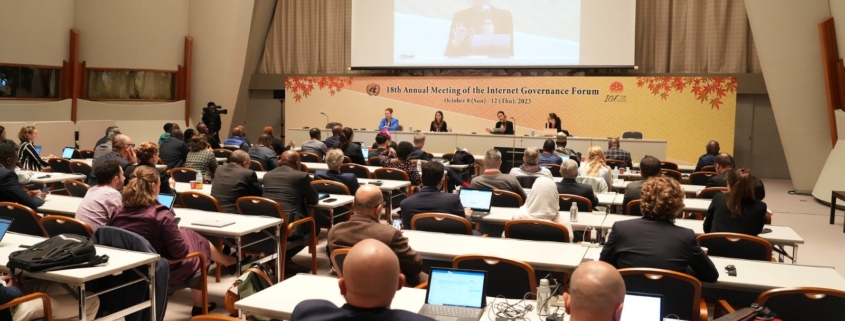On Monday, 9 October 2023, MEP Irena Joveva spoke at the Internet Governance Forum in Kyoto, Japan, in a debate on countering disinformation. She explained what the EU is doing in this area, but also stressed that even the most stringent legislation will not be enough to stamp out disinformation or fake news completely: “Disinformation can only be done away with by a reader who knows how to distinguish it from the truth”, she said unequivocally.
Joveva began by comparing her former position of a journalist with that of an MEP from the point of view of disinformation or fake news:
“The difference is that as a journalist I never felt affected. Now – as a politician – I do, but against my will.”
What she wanted to say, she explained, is that as a journalist she never even thought of manipulating facts, let alone writing a lie. As a politician, however, she is an obvious target of various campaigns to spread disinformation propaganda, which “are of course launched by a specific spectre of politics and its supporters”, but are never based on her work or the content she publishes, but on her appearance, gender, origin, etc.
She went on to talk about the work of the European Union in the area of countering disinformation, stressing that it is doing as much as it can within the limits of its competences. She mentioned the recently adopted position of the European Parliament on the European Media Freedom Act, where she was actively involved as a negotiator on the Parliament’s side. She also contributed to the drafting of the Digital Services Act:
“This Act obliges the industry to step up its efforts in the fight against illegal content online. It requires large online platforms and search engines to take measures to protect their users from harmful and illegal content, goods and services.”
Joveva asserted that everyone has to take responsibility in this area: politicians and multinationals, but especially the Member States, which have to enforce the legislation in practice.
She also highlighted the rapid alert system set up in the EU in response to the “infodemic” that occurred during the COVID-19 pandemic. The system, she said, is based on open information and draws on insights from academia, online platforms and international partners. It has also proved effective in the case of the Russian aggressor and the war in Ukraine, when rapid response to all forms of disinformation has also been important and necessary.
“Disinformation can be highly damaging if it is targeted, which it usually is. It leads to an increase in mistrust, division among populations, and threatens democracies.”
In the same breath, Joveva stressed the need for information campaigns and greater focus on media literacy in schools, as its importance is still generally underestimated. In her view, the way to truly win the fight against disinformation is not through tough legislation, but through knowledge and understanding of the content we are receiving.
She concluded the debate by saying that the EU is doing a lot of work, but that there is still much to be done, especially at the global level. In the end, it all comes down to clear communication based on verified information and to good cooperation between policy makers, stakeholders, the public and local organisations who search for solutions to protect our citizens and democracies in order to build a safer and better (online) world for all.
BACKGROUND
From 8 to 12 October 2023, the 18th annual meeting of the Internet Governance Forum is being hosted by the Japanese government in Kyoto. The Forum’s central theme is The Internet We Want – Empowering All People. The Forum will address eight themes: artificial intelligence and emerging technology; avoiding internet fragmentation; cybersecurity, cybercrime and online safety; data governance and trust; digital divides and inclusion; global digital governance and cooperation; human rights and freedoms; and sustainability and environment. MEP Irena Joveva participated in the session Counteracting disinformation to make the digital space trustworthy again, alongside Agustina Ordoñez, Member of the Argentinian National Congress, Sunil Abraham, Public Policy Director for Data Economy and Emerging Technologies at Meta India, Craig Jones, Director of the Cybercrime Directorate at INTERPOL, and Jennifer Bramlette, Coordinator for Information and Communication Technology at the United Nations Security Council.





Leave a Reply
Want to join the discussion?Feel free to contribute!